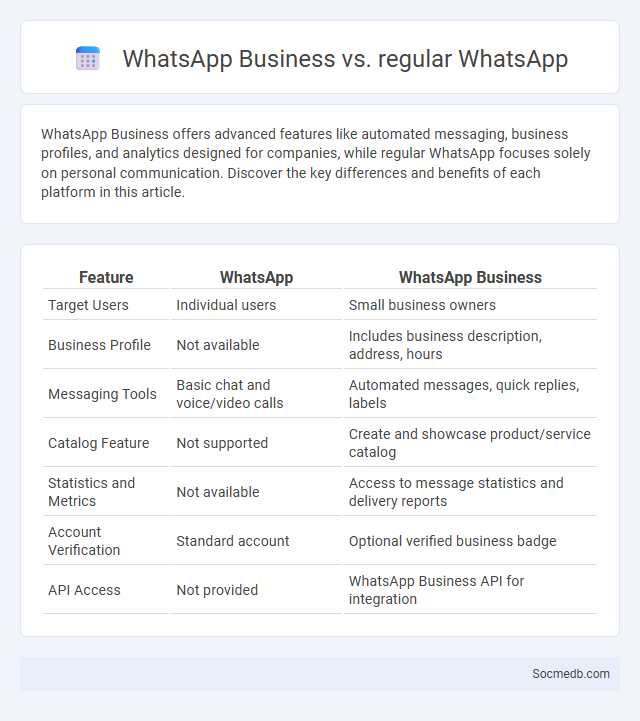
Photo illustration: WhatsApp Business vs regular WhatsApp
WhatsApp Business offers advanced features like automated messaging, business profiles, and analytics designed for companies, while regular WhatsApp focuses solely on personal communication. Discover the key differences and benefits of each platform in this article.
Table of Comparison
| Feature | WhatsApp Business | |
|---|---|---|
| Target Users | Individual users | Small business owners |
| Business Profile | Not available | Includes business description, address, hours |
| Messaging Tools | Basic chat and voice/video calls | Automated messages, quick replies, labels |
| Catalog Feature | Not supported | Create and showcase product/service catalog |
| Statistics and Metrics | Not available | Access to message statistics and delivery reports |
| Account Verification | Standard account | Optional verified business badge |
| API Access | Not provided | WhatsApp Business API for integration |
Introduction to WhatsApp Platforms
WhatsApp Platforms serve as a versatile communication tool, enabling businesses to interact with customers through messaging, voice, and video on a global scale. With over 2 billion users worldwide, WhatsApp offers API integration that supports automated customer service, marketing campaigns, and real-time notifications. You can leverage WhatsApp Platforms to enhance customer engagement while maintaining secure and personalized interactions.
What is Regular WhatsApp?
Regular WhatsApp is a widely used messaging app that allows you to send text messages, voice notes, images, and videos, as well as make voice and video calls over the internet. It operates on various platforms, including Android, iOS, and desktop, providing end-to-end encryption for secure communication. Your WhatsApp account links to your phone number, making it easy to connect with contacts without needing usernames or passwords.
Overview of WhatsApp Business App
WhatsApp Business App streamlines communication for small and medium-sized enterprises by providing tools tailored for customer engagement and efficient support. The app allows you to create a professional business profile, automate messages, and organize contacts through labels, enhancing personalized interaction with clients. Integration with WhatsApp's secure messaging platform ensures privacy while expanding your digital presence.
Understanding WhatsApp Business Account
WhatsApp Business Account enables small and medium-sized enterprises to communicate directly with customers through personalized messages, automated responses, and quick replies. The platform supports features like catalog showcasing, product listings, and integration with Facebook Shops, enhancing customer engagement and sales potential. Leveraging WhatsApp Business's analytics tools helps businesses track message metrics and optimize communication strategies for improved customer service.
Key Features Comparison
Social media platforms differ significantly in key features such as user interface, content format, audience engagement tools, and privacy settings. Instagram emphasizes visual content with Stories and Reels, while Twitter prioritizes brief text updates and real-time news sharing. Understanding these distinctions helps you select the platform best suited to amplify your message and connect effectively with your target audience.
Target Users and Use Cases
Social media platforms primarily target Millennials and Gen Z users who seek real-time communication, content sharing, and community engagement. Common use cases include brand promotion, influencer marketing, customer support, and social networking to foster connections and awareness. Businesses leverage social media analytics and targeted advertising to optimize reach and user interaction.
Security and Privacy Differences
Social media platforms implement varying security measures, with some offering end-to-end encryption and multi-factor authentication to protect user data. Privacy policies differ significantly, as certain platforms collect extensive personal information for targeted advertising, while others emphasize minimal data retention and user anonymity. Understanding these distinctions helps users make informed decisions about which social media services align best with their security and privacy preferences.
Pricing and Availability
Social media platforms offer a range of pricing models, including free access with ads, subscription plans, and premium features for businesses. Availability varies globally, with some platforms restricted in certain countries due to regulatory issues or censorship. You can choose the platform and pricing option that best fits your goals and budget.
Choosing the Right WhatsApp Solution
Selecting the right WhatsApp solution depends on understanding business needs such as customer engagement volume, integration capabilities, and automation features. WhatsApp Business API offers scalable options for medium to large enterprises, enabling enhanced messaging workflows and CRM integration. Small businesses may benefit from WhatsApp Business App's simplified tools tailored for personalized communication and quick response management.
Conclusion: Which WhatsApp is Best for You?
Choosing the best WhatsApp version depends on your specific needs, such as enhanced privacy features, business tools, or user interface preferences. Official WhatsApp offers reliable security and widespread compatibility, while modified versions provide customization but may risk security vulnerabilities. Evaluating your priorities ensures you select the WhatsApp variant that best supports your communication style and privacy expectations.
 socmedb.com
socmedb.com